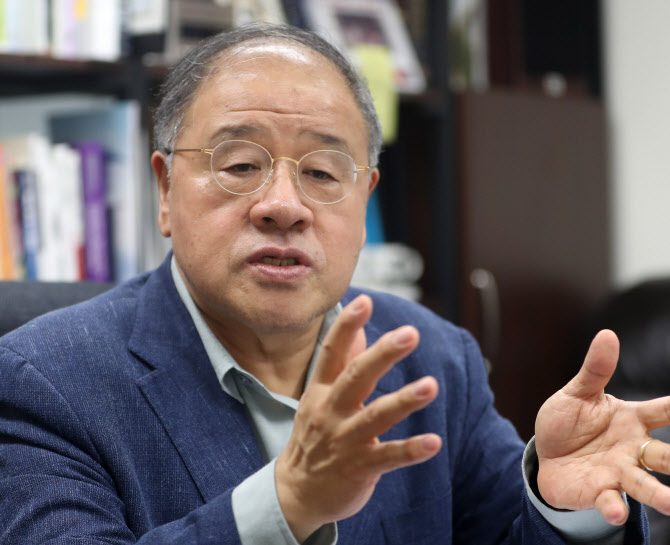[Ji-hyun Ham, Edaily Reporter] “Despite two decades of policy efforts and massive spending to address low birthrates, Korea has failed to achieve results. Without proper preliminary evaluations, funds were poured in without significant results, leading to a repeated cycle of introducing new policies. Policies were implemented without proper pre-evaluation, leading to repeated cycles of ineffective measures and wasted funds,”
Jong-beom Ahn, President of the Policy Evaluation Research Institute (PERI), emphasized in an interview with Edaily that scientifically designed policies are essential to address Korea’s demographic crisis and the looming threat of regional extinction.
|
Ahn points out that the failure of large-scale budget investments in South Korea‘s low birth rate policies is primarily due to insufficient scientific pre- and post-analysis. Since 2006, the government has allocated approximately 400 trillion KRW to address declining birth rates. However, these efforts have had little real impact due to lack of proper diagnosis after implementation.
“With the Low Fertility and Aging Society Committee and the Population Strategy Planning Bureau now in place, it is crucial to redesign policies from the ground up based on scientific data and methodologies. Repeating the same trial-and-error approach will only waste resources and yield limited results. Even if positive changes occur, it will be hard to identify the reasons,” he explains.
He further stated, “Korea’s historically low birth rate stems from various factors, including economic issues such as housing and education costs, as well as challenges that budget spending alone cannot resolve, such as career interruptions for women and social disadvantages. If we can accurately analyze and pinpoint the most critical causes, effective policies can be formulated without unnecessary obstacles.”
Regarding another major demographic issue - aging - Ahn highlights the need to address elderly poverty, not just through welfare, but by creating jobs that leverage seniors’ experience and skills. “While physical productivity may decline, labor markets are changing, and technologies like artificial intelligence (AI) can help maintain practical productivity. We need new policies-like those in Germany and Japan-that allow seniors to continue their careers and use their expertise,” he says.
Ahn also calls for pension reform, advocating for a system where people receive benefits proportional to their contributions, and for greater support to the poorest elderly. Additionally, he emphasized the need for a new pension model that ensures contributors receive benefits proportional to what they pay, helping to prevent generational conflicts related to the national pension system.
Ahn Jong-beom stated, “The basic pension serves as a key mechanism to ensure a minimum income for the elderly, and the number of blind spots in the system is gradually decreasing.” He suggested that policies should focus on providing more targeted support to impoverished elderly individuals, rather than universal welfare, to help them escape poverty.
Additionally, he warns that simply delaying the depletion of the national pension fund through minor reforms is not enough. “If structural reforms are not made to reduce the burdens on the younger generation, it could become another factor contributing to low birth rates.” He pointed to the ‘New Pension Plan’ proposed by the Korea Development Institute (KDI) as a necessary measure, explaining that the plan where individuals receive benefits based on their contributions while honoring existing commitments offers a promising solution. This would help ease financial pressure on younger generations while preserving previously promised pension benefits.
‘Immigration Policy’ as a Solution to Regional Decline
On regional population decline, Ahn suggests immigration policy as a potential remedy. Ahn stated, “Despite numerous attempts, regional revitalization has failed without quality jobs and industries outside the capital. It’s time for a serious discussion on immigration policy,” he says.
He further explained, “In order to attract high-skilled immigrants, adequate conditions for education and housing is required.“ He points to Incheon Songdo as a successful example of attracting high-skilled immigrants and calls for social experimentation on whether local governments are ready and how they should approach this challenge.
On June 19, the second day of the Edaily Strategy Forum, PERI will host a special symposium on “Population and Regional Policy in the Era of Low Birthrates.” The event will begin with Ahn’s welcoming speech, followed by discussions on △ regional policies in the era of low birth rates △ the importance of scientifically designed immigration policies △ differentiated regional population strategies △ and financial projections for population-related policies.
About Jong-Bum Ahn:
Dr. Ahn earned his Ph.D. in Economics from the University of Wisconsin, and has served as a researcher at Daewoo Economic Research Institute and the Korea Institute of Public Finance, professor at the University of Seoul and Sungkyunkwan University, and president of the Korean Association of Public Finance. He has also held public office as a member of the National Assembly and as Senior Presidential Secretary for Economic Affairs and Policy Coordination. In 2022, he founded PERI to pursue scientific evaluation of Korea’s economic and social policies.

!["청년 ''도시 선호'' 수용해야…빈집 철거해 도시 밀도↑"[ESF 2025]](https://image.edaily.co.kr/images/Photo/files/NP/S/2025/06/PS25061901218t.jpg)




